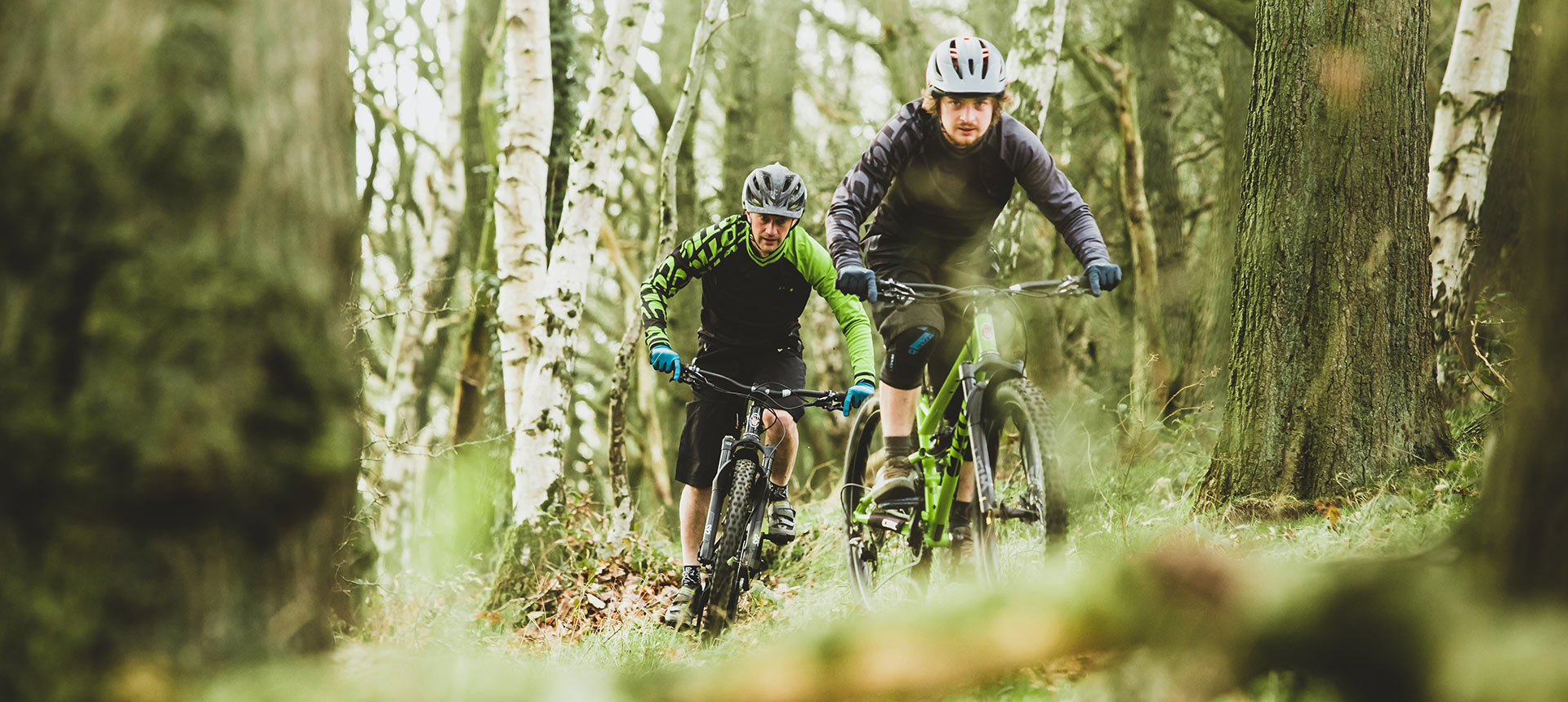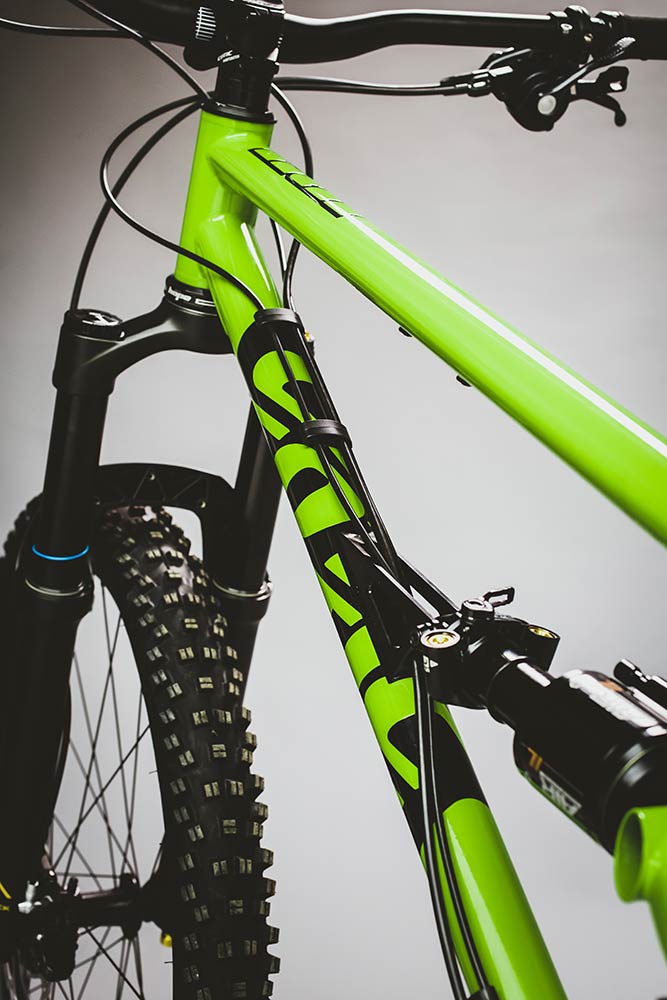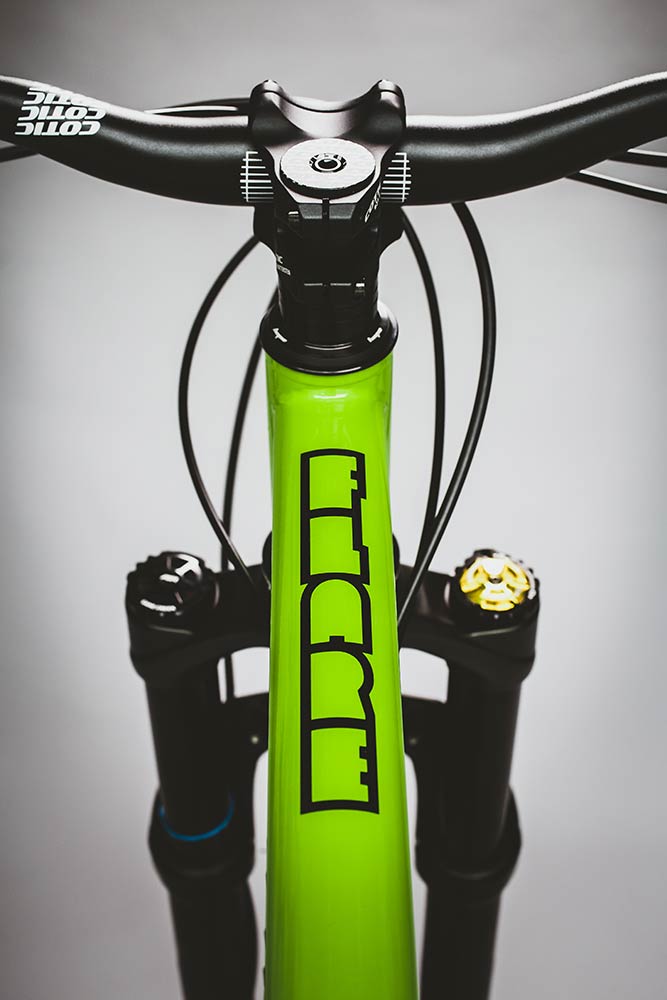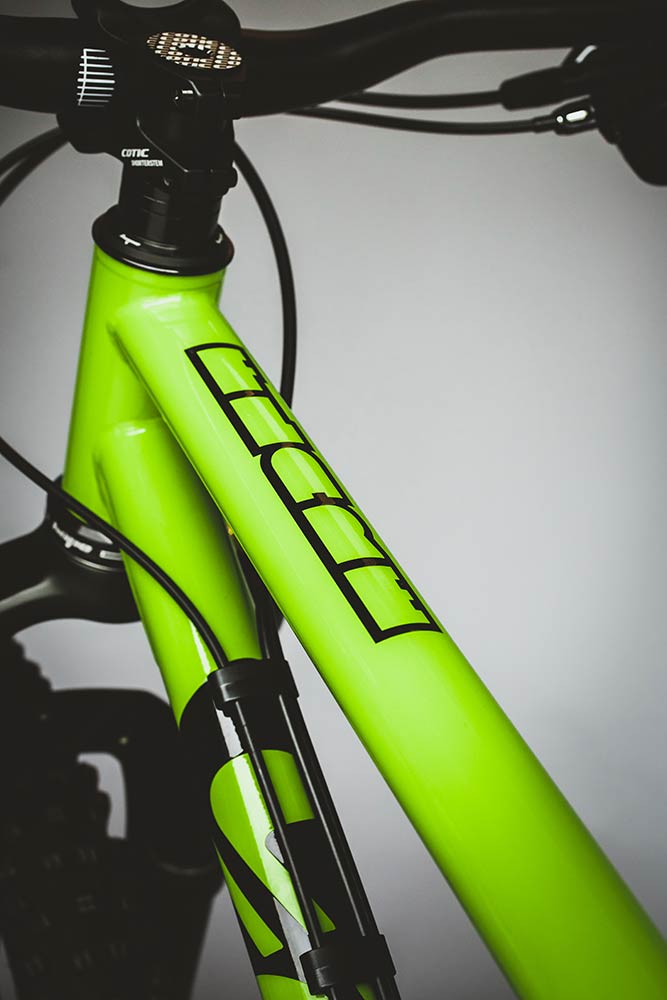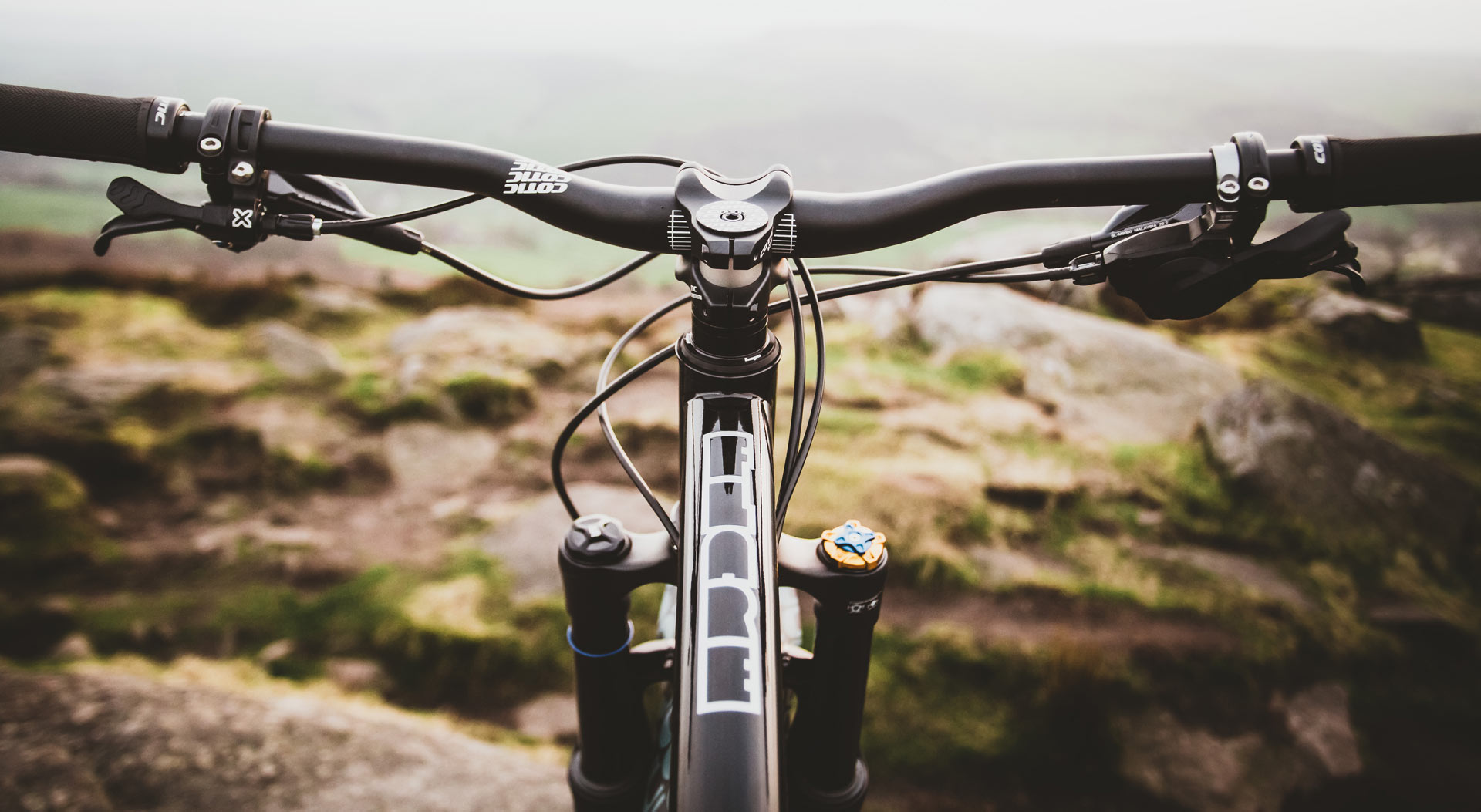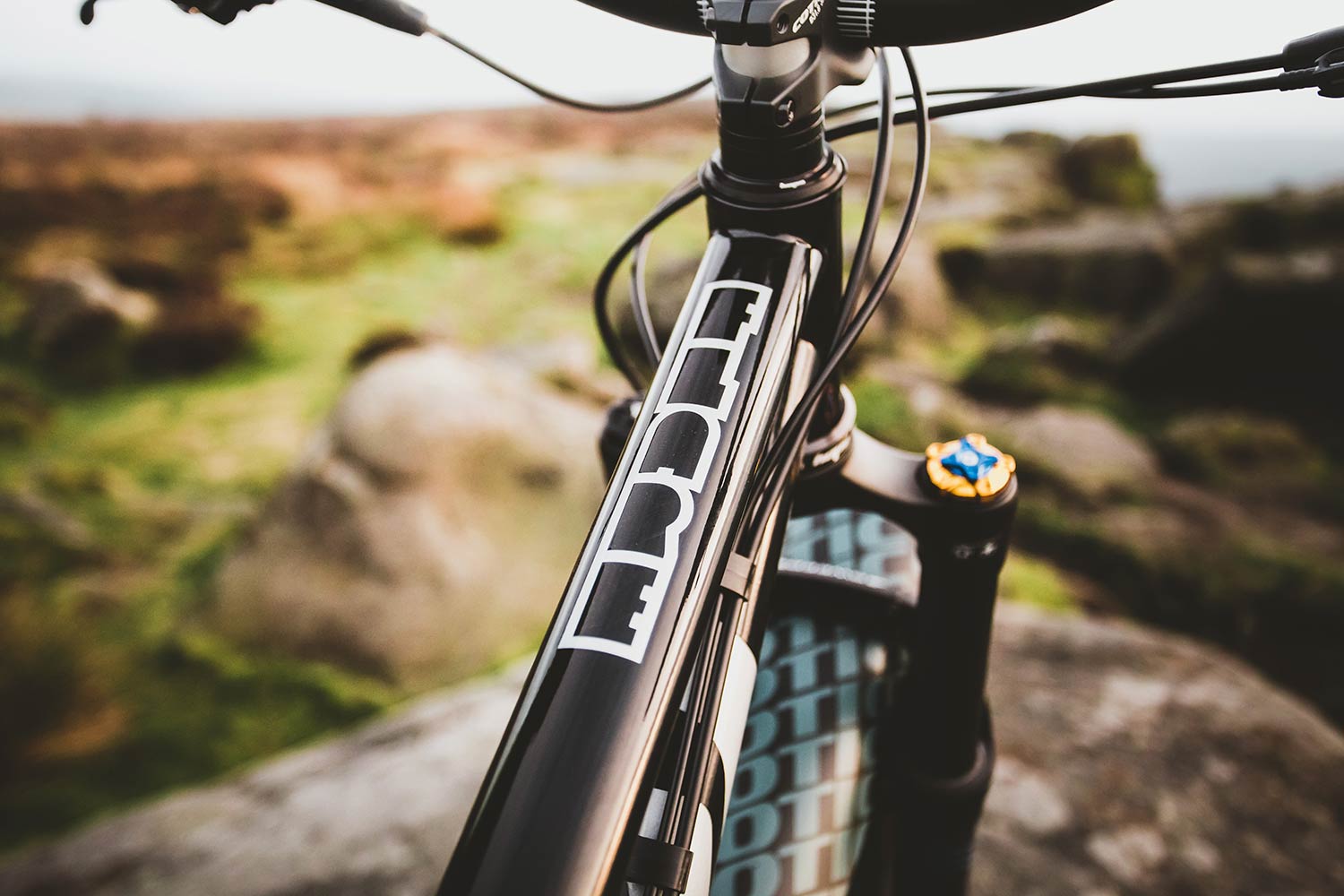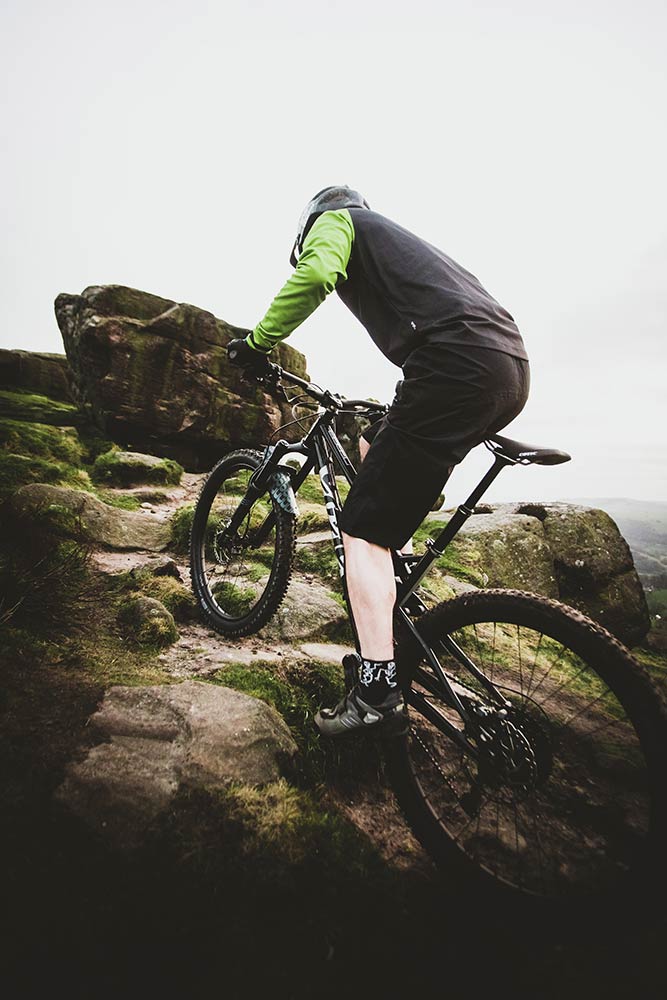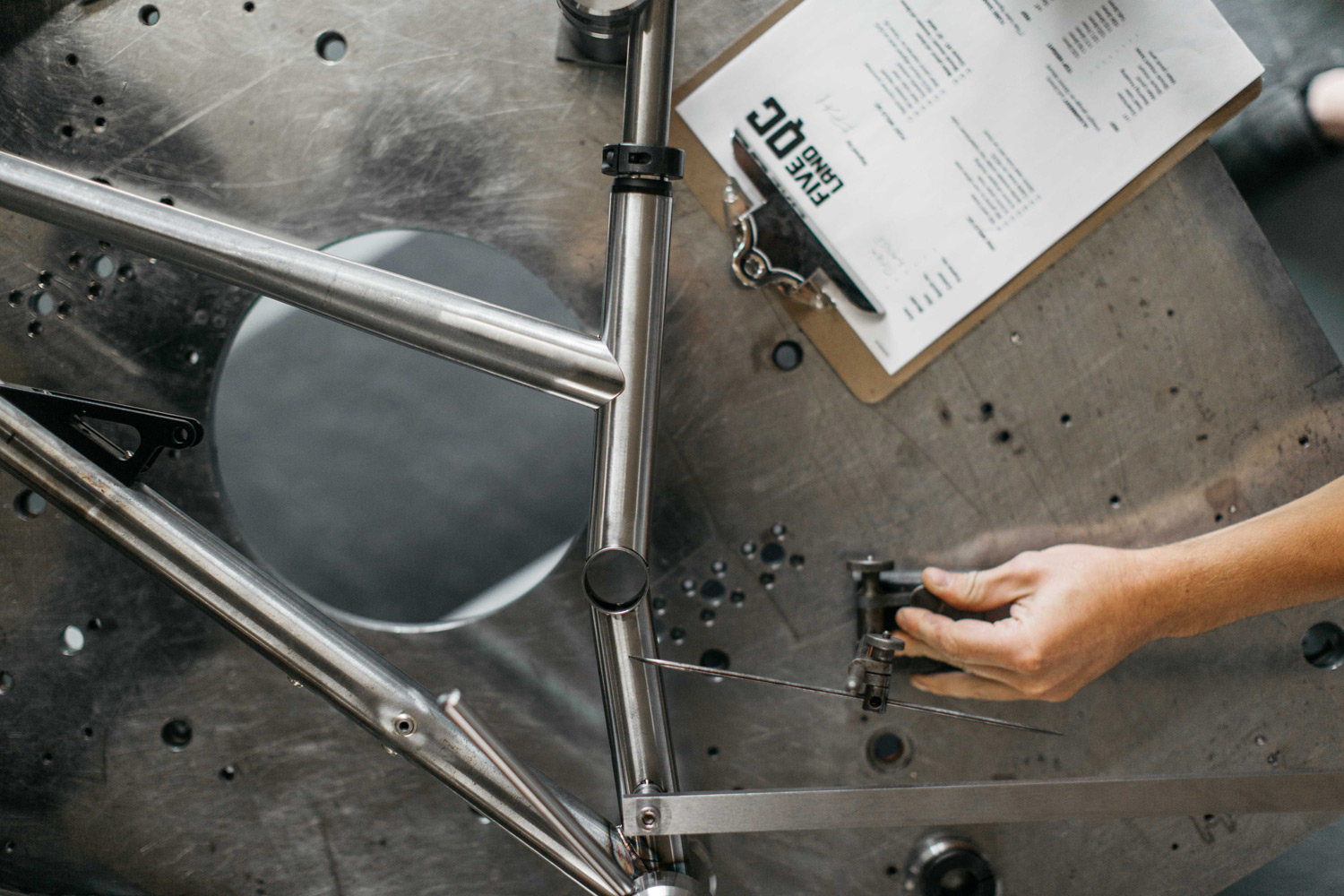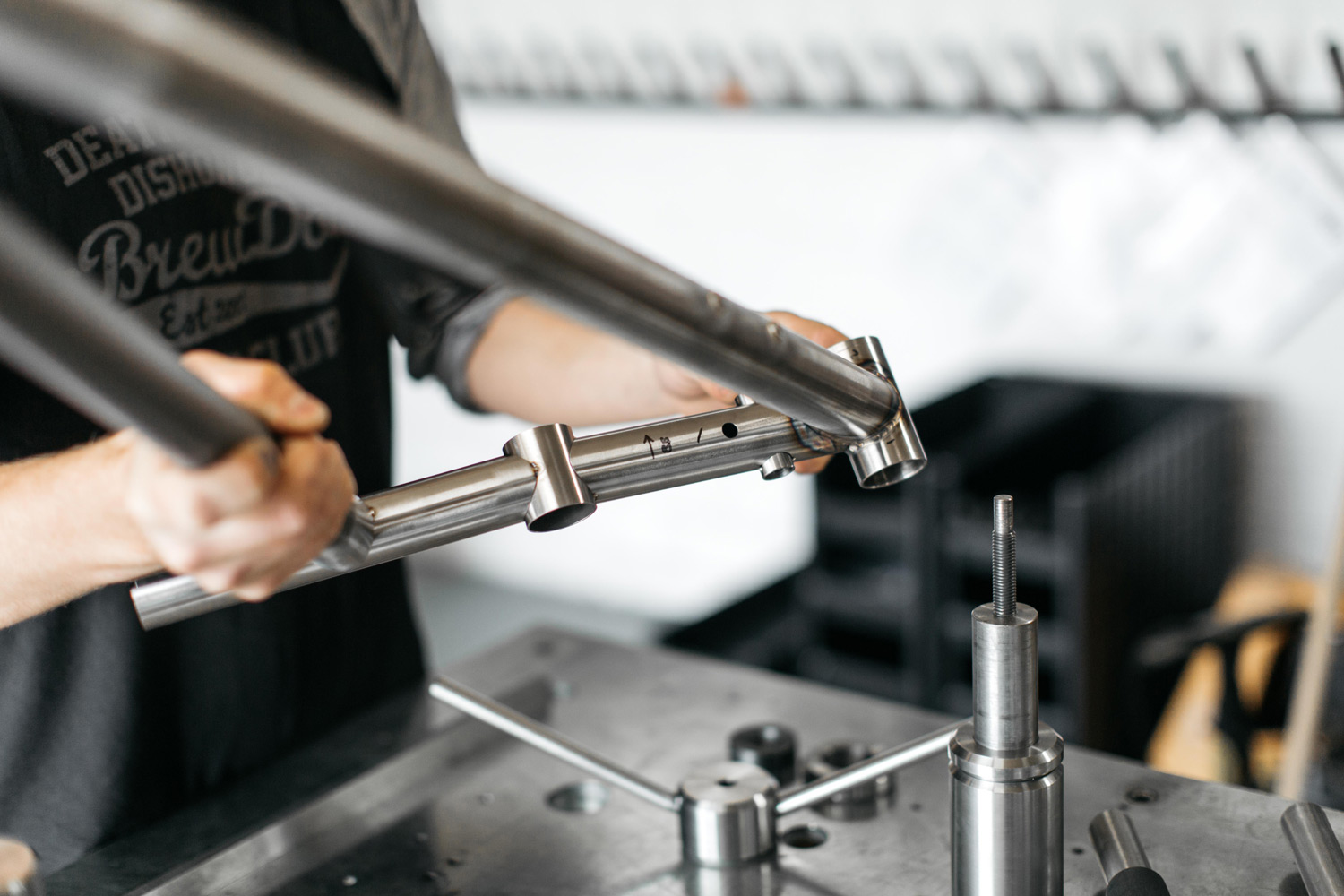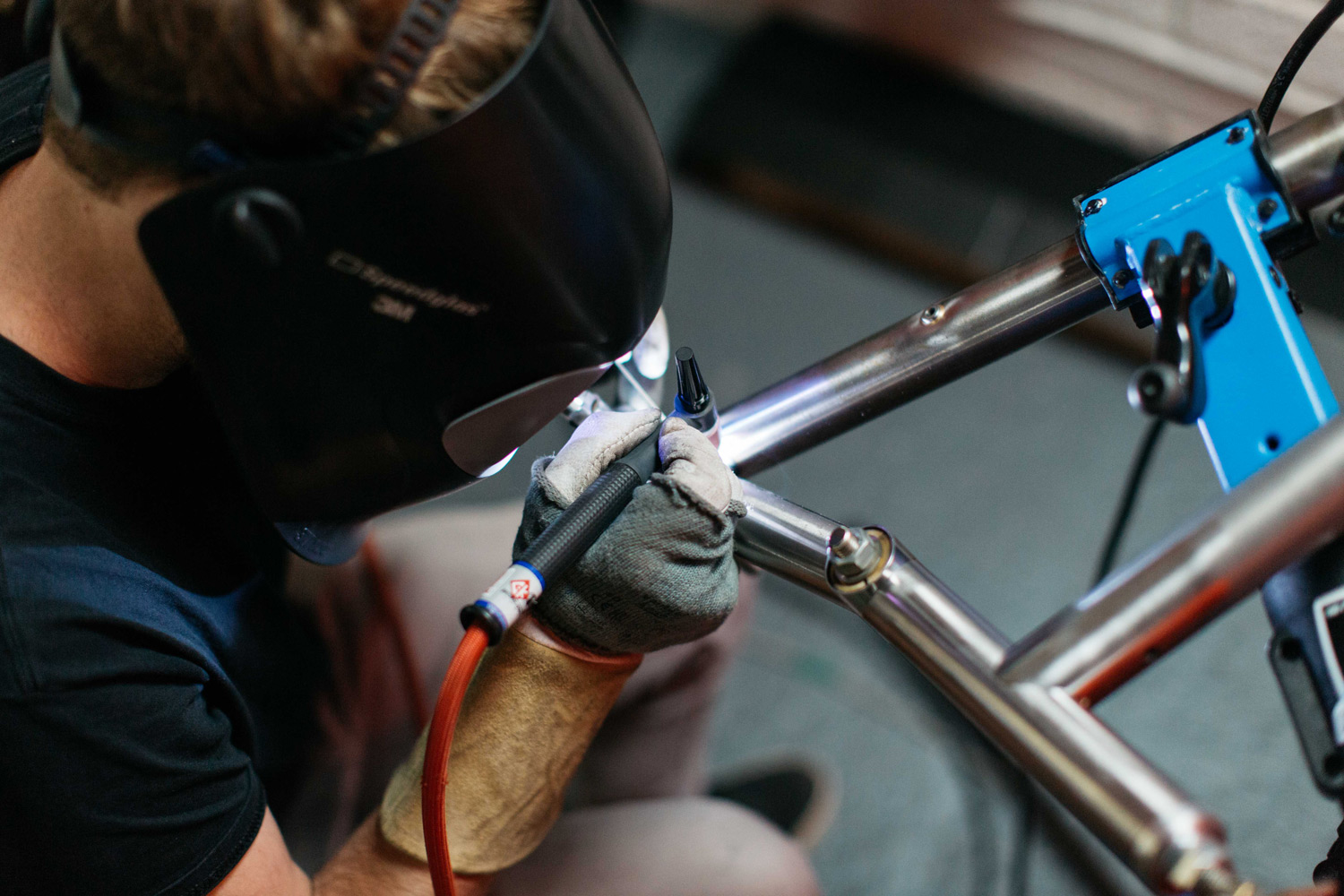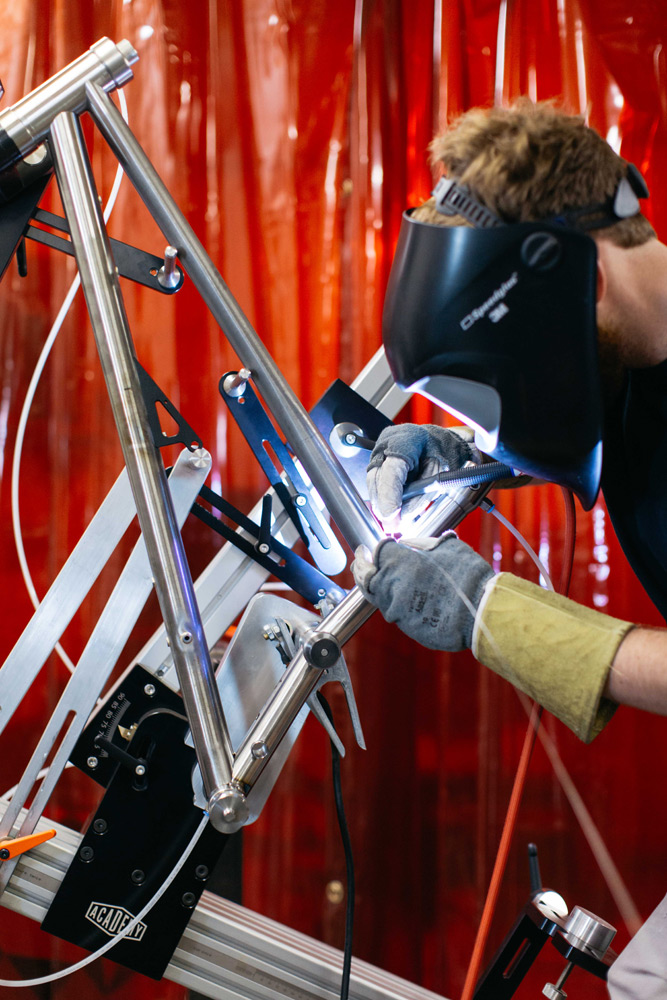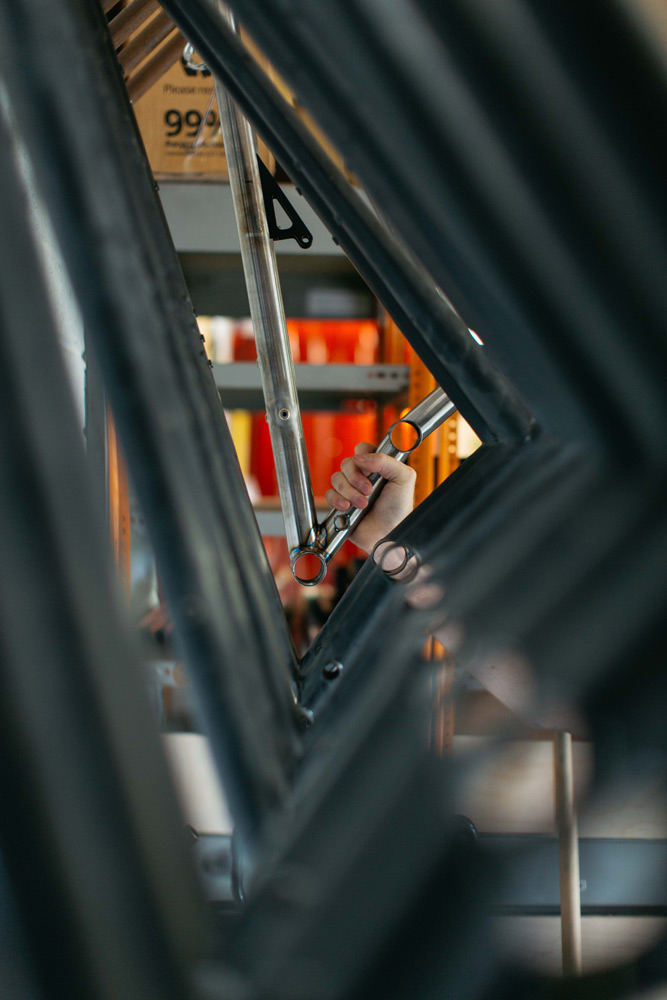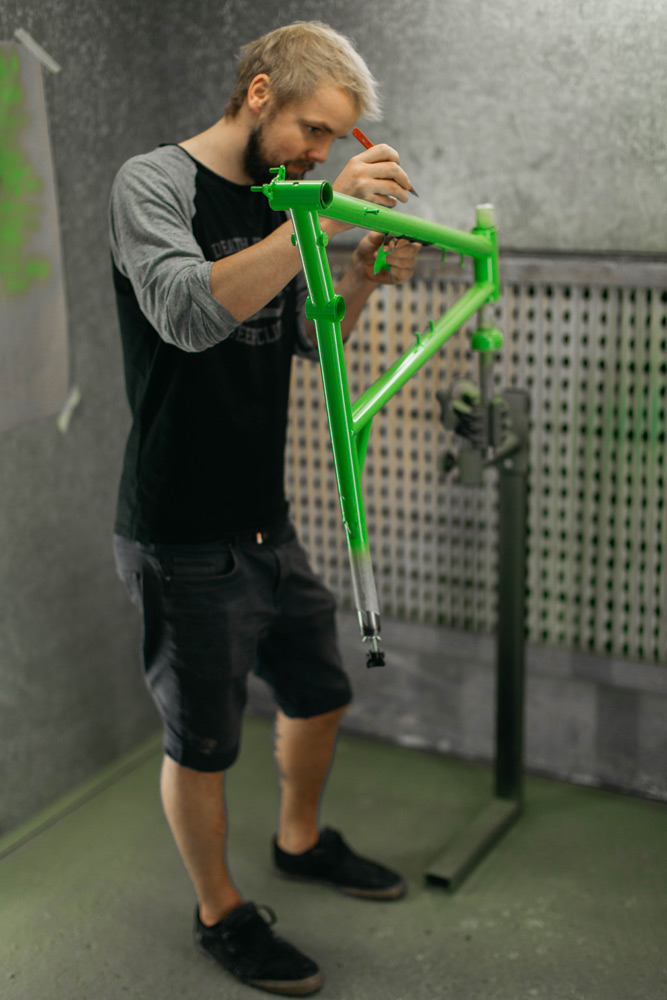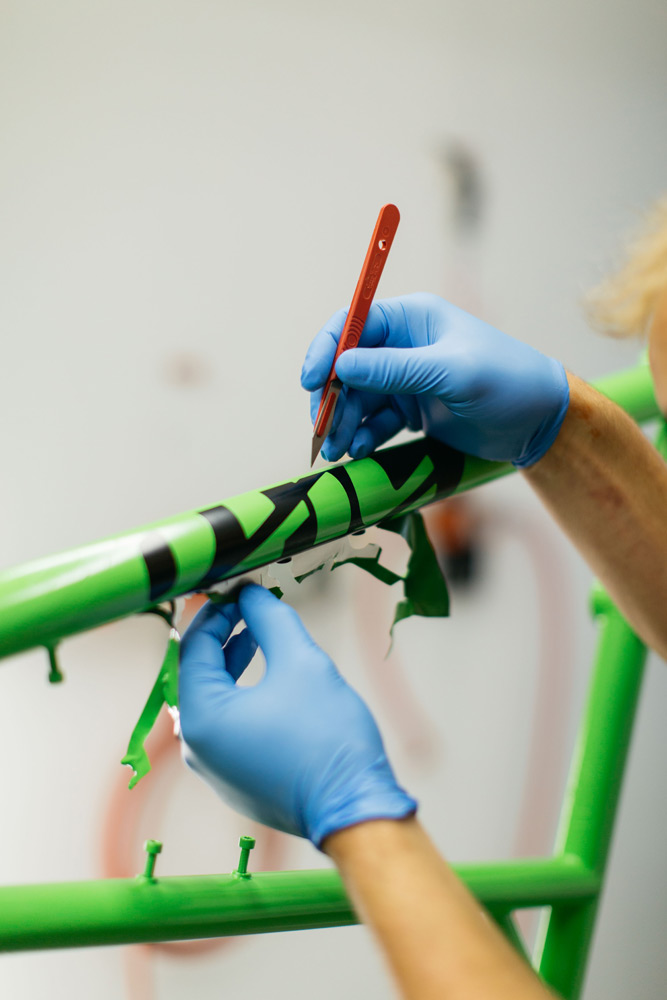Availability

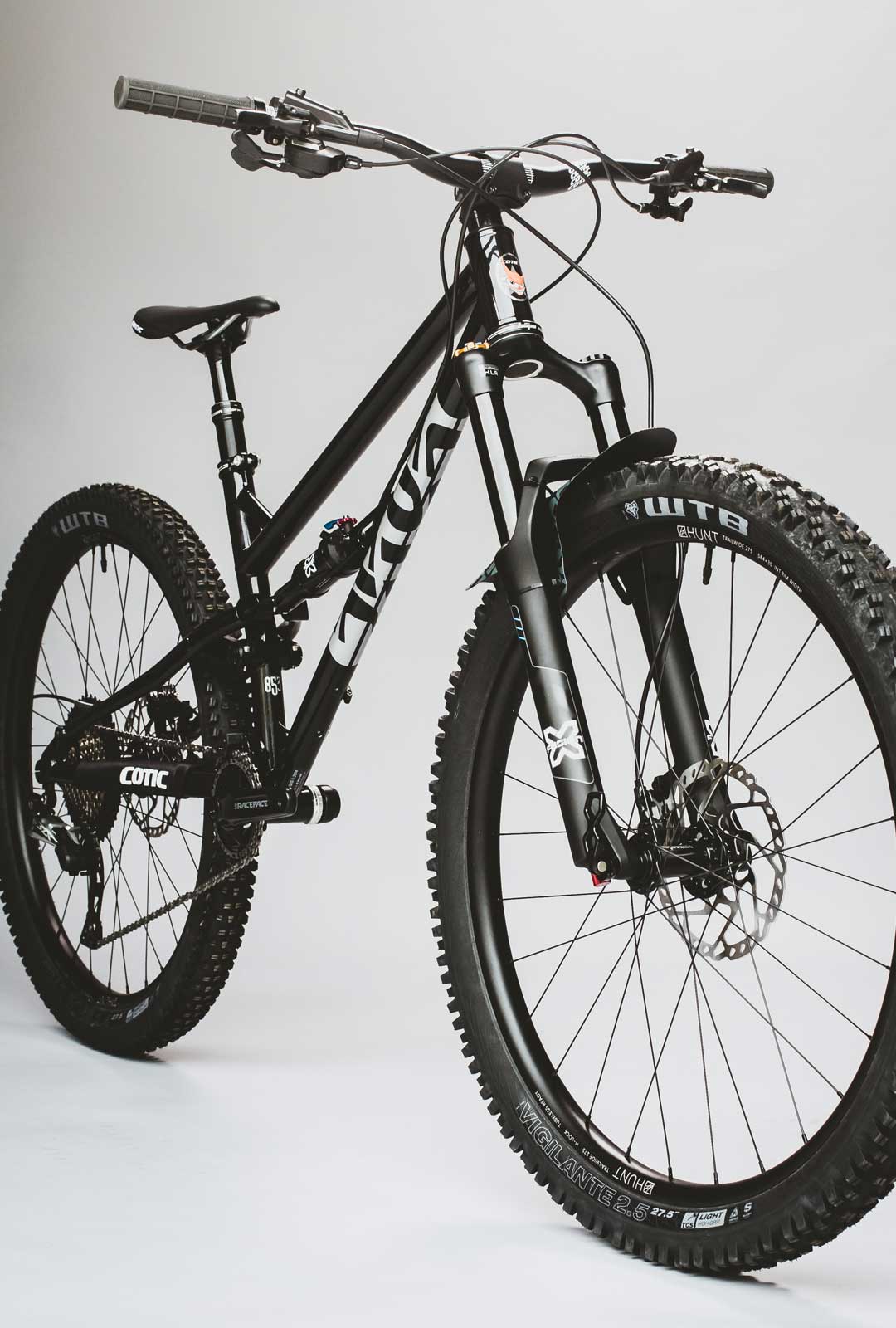
THE FLARE
IS NO LONGER IN PRODUCTION
The UK Made Flare combines the DNA of our Rocket enduro bike with the light, agile, subtle feel of our legendary Soul to bring a fun, fast, endlessly addictive ride into your life.
At heart the Flare is a technical trail tearaway. Lighter and easier to move around than our MAX 29er bikes, with more compact dimensions than our enduro focused Rocket, and droplink suspension brings more capability than our hardtails. The Flare ducks and weaves, pops and wheelies, scrabbles and clambers in and out of the tightest spaces. Optimised around 140mm forks, and sporting our radical Longshot geometry, it flows like water down singletrack, climbs beautifully, yet exudes confidence and pin sharp accuracy exactly when you need it in bigger or steeper terrain.
The Flare Reynolds 853 steel frame gives it a fleet footed feel and synapse quick, yet confidence inspiring handling. It scampers up climbs, and is massive fun whilst descending. A truly great All Round Mountain Bike.
Reviews
Read the fabulous Singletrack review of the Flare:
"It’s fiendishly difficult to find any negatives about the Flare."
"The interplay between the hugely effective Longshot geometry, droplink suspension and the steel front triangle provide an energetic, almost hyperactive character."
Click Here to read the full review
Read the Loam Wolf's outstanding review of the Flare:
"The Cotic Flare exudes feelings of fun times and is great for all day adventures in the hills on a variety of terrain."
Click Here to read the full review
Watch GuyKesTV's awesome "Knife to a Gunfight" live ride review here:
"It's like the Jason Statham of mountain bikes...."
Click Here to watch the full review
GuyKesTV Cotic Flare Data Download

Radical Longshot geometry keeps the bike stable through the rough stuff, planted in the corners and pinpoint accurate in the steep tech. Couple a super short 35mm stem to the optimised head angle and the bike really pushes you on, looking for every stump to boost off, rock to gap and berm to rail, keeping you connected to the trail while maintaining incredible poise and composure.
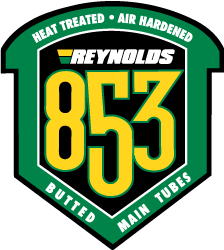
Reynolds 853 builds a light, lively and fantastically robust front end, and includes our custom ride tuned Ovalform top tube which helps to deliver that famous ride feel. The Flare uses Reynolds 853 super strong steel for it's made-in-the-UK front triangle. This includes our custom ride tuned Ovalform top tube which helps to deliver sublime trail damping and that signature Cotic feel; lively and fun, yet stable and controlled.
The frames' steel construction is compliant and naturally ground moulding, extracting grip and feedback from the trail where you thought there was none.If you want to learn more about the Flare's UK Made and finished construction, click here to read the Singletrack feature all about it...
The Flare is designed around the latest 27.5 x 2.6" wide trail tyres, with clearance to spare even with this monster rubber installed. 27.5" wheels are lighter, livelier and easier to accelerates than 29" or 27.5Plus wheels, with a more interactive feel. This is at the expense of slightly less stability and easy rollover on rockier, bumpier terrain. They also more easily package into a small frame - shorter chainstays, lower stack/head tube height - so the proportions suit shorter riders.

All Cotic bikes are assembled in the UK from and frame up. We have set specifications, but these are just the start. Want the Silver spec bike with tubeless tyres? Easy! Want a big can air shock on your droplink bike instead of the inline? It's there too. Full colour matched Hope parts, and add the matching brakes too? It's a click away, and everything else in between. If it's not a choice on the order form, just ask.
When you contact us you are talking to the people who design the frames and will be building your bike. We check it and build and pack it in our award winning bike boxes with the same care we would our own bike, because we know how important it is. We build your bike, for you.
If you like the idea of a suspension trail bike from Cotic, but want the versatility and easy rolling of 29er or 275 Plus wheels? Have a look at the FlareMAX.
Like your 27.5" wheels, but your ride a little faster and tougher? A little slacker and more enduro? You need the Rocket.
Maybe you like the liveliness and fun of the Flare, but you're more of a hardtail rider. You need the iconic, the original and best Soul.
Want to get right into the details about why our bikes are built the way they are? Geek away my friend!
- Read our Founder and Bike Designer Cy Turners' thoughts on why steel is a high performance choice for our full suspension bikes here.....
- Read all about the development and features of the Cotic droplink suspension here.....
- Listen to the Downtime Podcast where Cy tells the story of the development of Longshot geometry.....
- Radical Cotic Longshot geometry is specifically designed for 30-45mm stems, giving incredible steering responsiveness combined with hugely confidence inspiring capability at speed.
- Reynolds 853 Ovalform and DZB tubed front end brings precision, beautiful ride feel, durability and strength. Exclusive Cotic 35mm seat tube brings massive mid-chassis stiffness.
- 44mm standard head tube designed with external bottom cup for taper steerer compatiblity and zero stack top cup for minimal stack height
- 31.6mm seatpost size is dropper seatpost compatible. Internal 'Stealth' dropper post remote routing
- Regular threaded bottom bracket for reliability and ease of maintence
- Rear mech cable routed internally through the steel seatstay for clean lines and low noise
- Dedicated 1x drivetrain design - maximum width swingarm pivot, low drop, forged construction swingarm heads with integrated One Up Components award winning Top Guide. Combined with ISCG05 lower tabs for maximum drivetrain reliability and security
- 6066-T6 aluminium swingarm with Syntace X-12 BOOST148 x 12 rear axle for maximum wheel stiffness and mud clearance.
- Main and seat tube pivots are 15mm diameter, and droplink thru axle style linkage clamp keep the frame solid front to rear
- 1 bottle mount
- Clearance for big tyres - Latest generation 27.5 x 2.6" tyres
- Optimised around 140mm forks for great balance of speed and precision.
- 125mm of Cotic droplink suspension brings grip, fun and massive bump absorption capability via a strong progression rate
- Sizes - Small (390mm), Medium (425mm), Large (460mm)
- Weight - Gold Spec Bike 29.7lbs w/o pedals
The chart is a guide to frame size. Longshot Geometry means that the frames are low and long, with plenty of standover room. We recommend going for the size suggested for your height on the chart, and getting all the benefits of running a super short and responsive 30-35mm stem. It's a game changer. Make sure you consider your leg length as well. If you upsize you might not be able to fit a longer dropper post due to the collar hitting the seat tube top or the dropper post bottoming out on the seat tube droplink pivot. If you are unsure about that or anything else, drop us a line at size@cotic.co.uk and we'll be happy to discuss set up based on what you're riding at the moment and what seatpost you are planning to use.
140mm travel forks
| Frame Size | Small | Medium | Large |
|---|---|---|---|
| Seat Tube (centre-top) | 390mm | 425mm | 460mm |
| Top Tube Length (Effective) | 604mm | 629mm | 656mm |
| Head Angle | 66° | 66° | 66° |
| Seat Angle (Effective) | 74.5° | 74.5° | 74.5° |
| Chainstay Length | 437mm | 437mm | 437mm |
| BB Drop | -18mm | -18mm | -18mm |
| Head Tube Length | 100mm | 110mm | 120mm |
| Reach | 444mm | 467mm | 490mm |
| Stack | 579.8mm | 588.8mm | 597.8mm |
| Wheelbase | 1182mm | 1208mm | 1236mm |
| Usual Height Range | 165cm - 172cm | 169cm - 180cm | 178cm - 188cm |
| Stem Length | 30-50mm | 30-50mm | 30-50mm |
| Frame Wheel Travel | 125mm | 125mm | 125mm |
| Max Tyre Size | 27.5 x 2.6" | 27.5 x 2.6" | 27.5 x 2.6" |
| Maximum Seatpost Insertion (including actuator mechanism) | 178mm | 213mm | 248mm |
| All measurements are static based on 140mm travel fork. Seatpost Maximum insertion is guidance based on leaving 25mm clear below the actuator for any hose or cable to route through our frames. Your post may need less, or more, or if you use an externally routed dropper you won't need this margin at all. | |||
5 ¾" travel forks
| Frame Size | Small | Medium | Large | |
|---|---|---|---|---|
| Seat Tube (centre-top) | 15.35” | 16.7” | 18.1” | |
| Top Tube Length (Effective) | 23.8" | 24.8" | 25.8" | |
| Head Angle | 66° | 66° | 66° | |
| Seat Angle (Effective) | 74.5° | 74.5° | 74.5° | |
| Chainstay Length | 17.2" | 17.2" | 17.2" | |
| BB Drop | -0.7" | -0.7" | -0.7" | |
| Head Tube Length | 3.9” | 4.3” | 4.7” | |
| Reach | 17.5" | 18.4" | 19.3" | |
| Stack | 22.8" | 23.2" | 23.6" | |
| Wheelbase | 46.5" | 47.6" | 48.7" | |
| Usual Height Range | 5ft 5in - 5ft 8in | 5ft 7in - 5ft 11in | 5ft 10in - 6ft 2in | |
| Stem Length | 30-50mm | 30-50mm | 30-50mm | |
| Frame Wheel Travel | 5" | 5" | 5" | |
| Max Tyre Size | 27.5 x 2.6" | 27.5 x 2.6" | 27.5 x 2.6" | |
| Maximum Seatpost Insertion (including actuator mechanism) | 178mm | 213mm | 248mm | |
| All measurements are static based on 140mm travel fork. Seatpost Maximum insertion is guidance based on leaving 25mm clear below the actuator for any hose or cable to route through our frames. Your post may need less, or more, or if you use an externally routed dropper you won't need this margin at all. | ||||
The suspension on your Cotic droplink bike is designed to work at it’s best when the suspension ‘sags’ with the rider on board the bike. 'Sag' is the amount the shock compresses with a rider on board. The suspension works at its best when set with between 25% and 30% of the available travel as sag, with our preferred starting point being 30%.
Your Flare Gen2 has a 45mm stroke shock (125 travel) or 50mm stroke (135), so that means:
- 11-15mm sag on the shock
- 28-35mm sag on a 140mm fork
As a starting point we suggest going for the middle of those options, so 13mm sag rear (regardless of travel option), and front sag of 32mm (140 fork).
How To Set Your Shock Sag
Using a shock pump, put 170psi in the rear shock. Leave your forks as they are (if you've already set them up) or put the recommended pressure for your weight in them according to the fork manufacturer's manual.
Check the shock and turn off any lockout or Climb Switch. This allows the shock to compress unhindered and ensures a more accurate sag measurement.
Put your riding kit on. Or at least a fully loaded backpack if you usually ride with one. Make particular note of the amount of water in your pack or your bottles. It's probably the heaviest thing you strap to your bike after yourself, and it makes a difference to the suspension setup.
Set the saddle to your correct full pedalling height.
Mount the bike and go for a quick ride in a suitably quiet area. Whilst riding, bounce on the saddle a couple of times to get the rear shock compressing as much as you can.
Pull in somewhere safe, stop, get off the bike and slide the o-ring on the shock down against the seal. Now get back on the bike and with saddle at full height sit down and let your legs dangle off the pedals and make sure the o-ring on the shock is still up against the seal. Now, gently get off the bike without moving the shock (dropping the saddle and using a kerb or something as step helps).
Once off the bike, measure the distance between the o-ring and the shock body. Adjust the air pressure in the shock accordingly to get the desired amount of sag.
How To Set Your Fork Sag
Once you’ve set the rear sag, check the front fork sag. If your bike is brand new, put 60psi in the fork to start with and dial all the compression damping adjuster to minimum. For forks, we recommend running with 20-25% sag.
In a quiet area with minimal traffic, drop the saddle and ride around slowly, giving the forks a bounce once or twice to free them up. Whilst rolling along, sit down and – being careful of the spinning wheel - slide the o-ring on the fork leg down to the seal. Now stand up slowly into a balance position on the bike as if you're about to do a downhill section of trail. Now, without moving the fork any more, move yourself rearward and sit down, and slowly roll to a halt. If you have to use the brake, use it very gently and carefully so that you don't dive the fork under braking and mess up your sag measurement. Gently get off the bike and measure the distance from the o-ring to the fork seal. That is your sag. For a 130mm fork, you should be aiming for around 26-32mm sag (20-25%).
If the fork sag requires alteration, alter it, then check the rear sag again. Keep doing this procedure until both front and rear sag is set as desired by the rider, within the manufacturer recommendations for the frame and fork.
Weight Distribution
It’s worth noting that as the weight distribution of all bikes is different, being dependent on saddle position, stem length and bar width amongst many other things. It’s quite possible that with the correct sag at the rear of the bike, your forks may end up with too much or too little sag because there’s more or less weight on them compared to your previous bike. This is why we don't recommend any particular pressures, because even quite subtle differences in your saddle/cockpit set up compared to anything we measure will result in different pressures being required for a given level of sag. We always recommend setting up using sag measurement as your guide, not a generic shock pressure.
How To Set Damping - Shock
Once the front and rear sags are set, adjust the rebound and compression damping to your preference. If you have specified the Cane Creek shock, then our base setup is on the shock when it's delivered. These settings are listed below all relative to fully open position on the adjusters:
DB Air IL
- 1 x large volume spacers
- 0 Turns HSC (High Speed Compression)
- 6 Clicks LSC
- 1.0 Turns HSR
- 4 clicks LSR
Follow the excellent instructions in the Cane Creek Field Tuning Guide (click here to download) for fine tuning of your Cane Creek shock.
Cotic base settings tend to run on the lively and fast rebound side of things. This might feel quite different to what you were previously used to, but do stick with it for a couple of rides before making changes. Light rebound damping let's the rear wheel 'patter' and maintain traction better. The links to the base tune for your Cane Creek shock can be found above in the Component Sizes tab.
For other shock brands:
Rebound
It is recommended to start with the rebound 3 clicks from fully open. As mentioned above, we believe that the fastest rebound you can run with safely is the best for traction and lively feel. If you feel like you’re being bounced out of the saddle on big compressions, or springing back too hard off drops, or the bike feels like it’s bouncing back at you at high speed on rocky sections, then add more rebound damping until this sensation is eliminated.
Compression / Pedal Platform
It is recommended to start with the compression damping/pedal platform switched off (or set to minimum). The Cotic Droplink suspension is designed not to require the assistance of a compression damping circuit to give good pedalling performance. Using the minimum setting allows the suspension to move under bump forces more easily and track the ground better.
How To Set Damping – Fork
As with the rear shocks, we recommend running the fork damping as light as possible for best traction.
Rebound
Set this in the middle of the range and see how it feels matched up to the rear shock. As with the rear, try riding it faster than you ordinarily would. It's amazing what a difference it makes, and it's key to getting the most out of the fast acting rear shock, because it keeps the bike in balance.
Once you have done a couple of rides, if you feel the in higher speed bumpy trails the fork is kicking back too much for your liking, or too much that you lose confidence, then increase the rebound damping. If you find the middle setting OK, trying making it faster until you get to the point of it feeling sketchy, then go back one click.
Compression
Almost regardless of size, weight or style of riding, everyone at Cotic runs the high speed compression damping on their fork fully open, or very close to it. We recommend you start with fully open and go from there. If you find you are using the full travel a little too easily for your liking, we suggest adding 1 volume reducer to your fork air spring rather than ramping up the damping.
For low speed compression damping, this is a balance between traction and helping keep the fork held up, so for this we recommend starting with it set in the middle of the range. If you are finding that the bike feels confidence inspiring, but it's a little uncomfortable or 'chattery' through your hands, try reducing the low speed compression 3 clicks. If you feel that the sag and air spring feel is what you want but you are getting a lot of diving under heavy braking, or in steep terrain, try adding 3 clicks. Keep refining like that until you are happy with the setup.
A Bit of Advice
One thing to avoid is setting the rebound based on the 'bounce in the street' test. This usually results in setting the rebound too slow for good grip in trail riding conditions, because doing the 'bounce test' with rebound set fast enough for good performance usually feels too fast in this unhelpful scenario. Only start adjusting once you have a feel on the trail.
Try It Out – The Only Way You'll Know Is By Going For A Ride
We recommend starting at 15mm shock sag and going for a couple of rides to see how this feels. This is a good middle ground for tackling the trails with an active, plush feel combined with a low bottom bracket height for confident handling.
If you feel that you’re catching your pedals too often, or the steering isn’t as fast as you’d like, or you're not getting the climbing position you want, then add more air to the shock and reduce the sag 1 or 2mm, or maybe drop the sag on your fork a few extra millimetres to move your weight forward.
It's well worth taking a couple of hours and doing laps of a trail you know well, and making changes one at a time. A good way to learn it to turn one damping dial fully closed, do a run, then go again with it fully open. You will learn what these big changes to damping do to the bike, which will help you make more subtle changes afterwards.
Take Some Notes Before Tweaking
With all the adjustments available on modern suspension it’s quite possible to get lost chasing a set up and ending up with a bike that doesn’t handle too well. So, if you’ve twiddled and tweaked and the handling just seems to be getting worse, go back to your base setup.
Don’t be afraid to experiment with your suspension settings and general bike setup (stem length, bar height, etc), but always have a base set up written down that you can go back to. This should include a fork travel (if the fork is adjustable) with air pressures for front suspension units. Note down how many clicks of rebound you're running. Same goes for compression damping if its adjustable on your fork.
As your experience grows, you’ll begin to know what certain adjustments do and how to undo them, but it’s a learning curve so keep your head and don’t be afraid to start from scratch.
We really think you could get more out of your bike by playing around with things a little. We're always happy to help if you want advice. Just drop us a line at info@cotic.co.uk
Our service doesn't stop when you order a frame. We want to help you enjoy your new bike to its full potential.
Seatpost diameter: 31.6mm (get 380mm long minimum)
Front Mech: Not applicable - 1x drivetrains only.
Fork: 140mm travel, 533mm axle-crown (without sag)
Bottom Bracket width: 73mm
Bottom Bracket thread: Conventional English/BSA
Chainring: Single only, boost chainline
Chainguide Mounting: ISCG05 bottom 2 tabs. Integrated Cotic x OneUp Components Top Guide (included with frame or bike)
Headset: 44mm for Taper Steerer forks: Hope 2H, Cane Creek ZS44 Top/EC44 Bottom, Chris King Inset I7
Rear Hub: Boost148 x 12 bolt through
Rear Axle: Syntace X-12
Rear Mech Hanger: Syntace X-12 Type 1 (Conventional or Shimano Direct Mount)
Shock: 190 x 45 AIR SHOCK ONLY
Shock Fittings: 15.75 x M8 Down Tube End, 24.0 x M8 Seatstay End
Dropper Post Routing: Stealth via the down tube
Rear Brake Mounting: I.S. Compatible with up to 203mm diameter rotors



